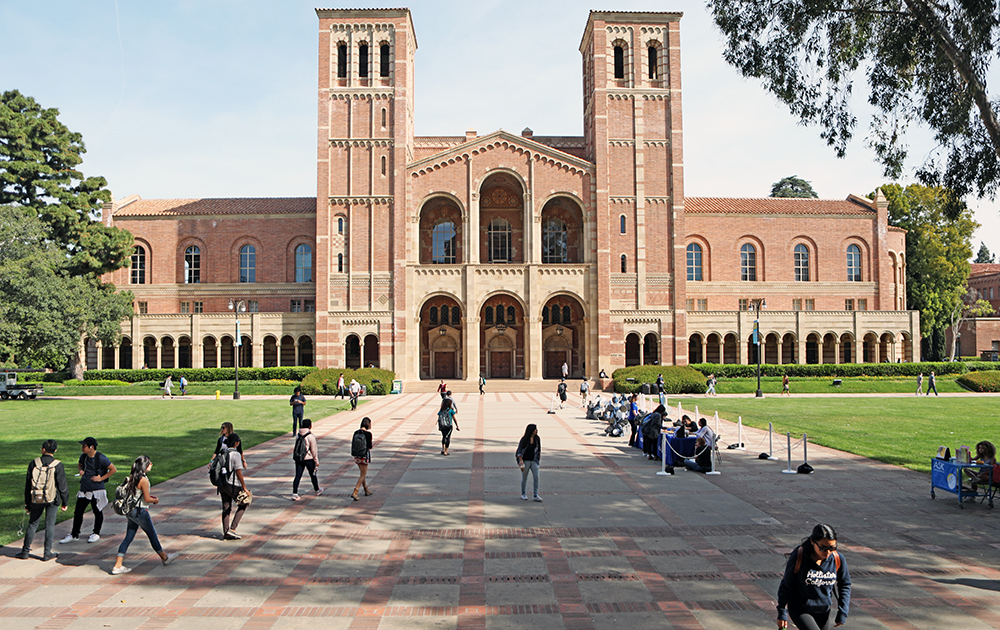The percentage of students from other states and nations will be frozen at current relatively high levels at four University of California campuses, but will be allowed to grow to 18 percent at the other five undergraduate campuses, according to a new policy adopted Thursday by the UC regents.
The Berkeley, San Diego, Los Angeles and Irvine campuses, where the percentage of non-Californians ranges from 24.4 percent to 18.9 percent, will not be allowed to increase beyond the levels of the 2017-18 school year. The other five campuses, where the share ranges from 14.7 percent at Davis to less than 1 percent at Merced, can grow that enrollment to 18 percent.
The approval came after years of debate over the academic and financial value of nonresident students and whether their presence helped Californians or squeezed them out of campuses.
UC president Janet Napolitano said the policy “strikes the appropriate balance between nonresident and resident enrollment, particularly given our commitment to enroll every eligible California resident.”
She said the new rules emerged after discussions with legislative leaders. State legislation called for withholding $18.5 million in enrollment funds from UC if no action were taken on the issue by this month.
The number of students studying at the University of California from other states and nations has skyrocketed in the past decade, from about 5 percent to the current 16.5 percent of all 210,170 undergraduates. That led to complaints from parents and legislators that Californians were being squeezed out, a contention that UC officials deny.
The new policy will affect only undergraduates, not UC’s graduate and professional school students, of whom about 44 percent are from out of state.
In contrast to a previous proposal that was presented in March and attracted criticism, no systemwide limit was established and the ceiling for most campuses was reduced from 20 percent to 18 percent. Still, the policy adopted Thursday allows for the system to add students from outside California and garner the extra tuition they must pay, which totaled $550 million this year.
To help foot the bills, prestigious public universities in other states have much higher levels of nonresident undergraduates. Flagship campuses in Michigan, Colorado, Wisconsin and Virginia all top 30 percent.
Regent Hadi Makarechian joined Gareth Elliott in casting the two votes against the measure Thursday. Makarechian, an Armenian who was born in Iran and attended college in the United States, said the enrollment limits would hurt foreign students and limit their large contributions to California’s society and economy. “I know the in-thing today is to build walls, but we are building a wall around the University of California by doing this,” he said.
UC administrators insist the new policy maintains the commitment to offer eligible Californians a spot on at least one campus, but not necessarily at students’ first-choice campus. They also emphasize that state residents learn a lot from rubbing shoulders with young people from Texas, New York, China and France and that the extra revenue from nonresidents helps pay for professors’ salaries and Californians’ financial aid.
In March, the UC regents debated a proposal that would have capped out-of-state students at 20 percent of undergraduates systemwide and at six of the nine undergraduate campuses. For the other three campuses – Berkeley, San Diego and Los Angeles – out-of-state enrollment would have been frozen at their current levels.
However, some faculty and regents said that formula unfairly favored campuses that already had sharply increased the number of nonresidents and would have hurt the chance of the other campuses to gain the extra tuition money from such growth.
Last year, a report by the state auditor found that the increasing number of nonresidents caused “significant harm to state residents and their families.” At the time, UC criticized those findings, calling them “false and misleading.”
For next year, nonresidents will pay $28,014 in supplemental tuition in addition to the basic $12,630 that Californians will pay.
| Campus | Total undergraduates | % Calif residents | % Other domestic U.S. | % International |
|---|---|---|---|---|
| UC Systemwide | 210,170 | 83.5 | 5.6 | 10.9 |
| Los Angeles | 30,873 | 77.2 | 11.0 | 11.7 |
| Davis | 29,379 | 85.3 | 3.2 | 11.5 |
| Berkeley | 29,310 | 75.6 | 12.8 | 11.6 |
| San Diego | 28,127 | 77.1 | 4.9 | 17.9 |
| Irvine | 27,331 | 81.1 | 2.9 | 16.1 |
| Santa Barbara | 21,574 | 87.8 | 4.0 | 8.2 |
| Riverside | 19,799 | 96.9 | 0.7 | 2.4 |
| Santa Cruz | 16,962 | 92.4 | 3.3 | 4.3 |
| Merced | 6,815 | 99.6 | 0.2 | 0.2 |
University of California
To get more reports like this one, click here to sign up for EdSource’s no-cost daily email on latest developments in education.
